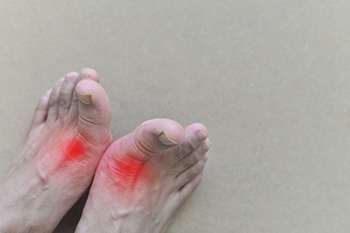How to Know if You Have Gout
Tuesday, 01 October 2024 00:00
Gout is a form of arthritis caused by a buildup of uric acid crystals in the joints, leading to sudden and intense pain. Common symptoms include severe joint pain, typically in the big toe, along with swelling, redness, and warmth in the affected area. The pain often starts at night or early morning and can become excruciating within hours. A gout flare-up usually lasts between three to 10 days, with the most severe symptoms occurring in the first 24 to 48 hours. It may subside on its own but can return if left untreated. To handle a gout flare-up, rest the affected joint, and it is suggested that you contact a podiatrist for an appointment and examination. This type of doctor can prescribe medications such as colchicine or corticosteroids that can help reduce symptoms.
Gout is a painful condition that can be treated. If you are seeking treatment, contact the podiatrists from New England Family Foot Care. Our doctors will treat your foot and ankle needs.
What Is Gout?
Gout is a form of arthritis that is characterized by sudden, severe attacks of pain, redness, and tenderness in the joints. The condition usually affects the joint at the base of the big toe. A gout attack can occur at any random time, such as the middle of the night while you are asleep.
Symptoms
- Intense Joint Pain - Usually around the large joint of your big toe, and it most severe within the first four to twelve hours
- Lingering Discomfort - Joint discomfort may last from a few days to a few weeks
- Inflammation and Redness -Affected joints may become swollen, tender, warm and red
- Limited Range of Motion - May experience a decrease in joint mobility
Risk Factors
- Genetics - If family members have gout, you’re more likely to have it
- Medications - Diuretic medications can raise uric acid levels
- Gender/Age - Gout is more common in men until the age of 60. It is believed that estrogen protects women until that point
- Diet - Eating red meat and shellfish increases your risk
- Alcohol - Having more than two alcoholic drinks per day increases your risk
- Obesity - Obese people are at a higher risk for gout
Prior to visiting your podiatrist to receive treatment for gout, there are a few things you should do beforehand. If you have gout you should write down your symptoms--including when they started and how often you experience them, important medical information you may have, and any questions you may have. Writing down these three things will help your podiatrist in assessing your specific situation so that he or she may provide the best route of treatment for you.
If you have any questions, please feel free to contact our office located in Milton, MA . We offer the newest diagnostic and treatment technologies for all your foot care needs.




